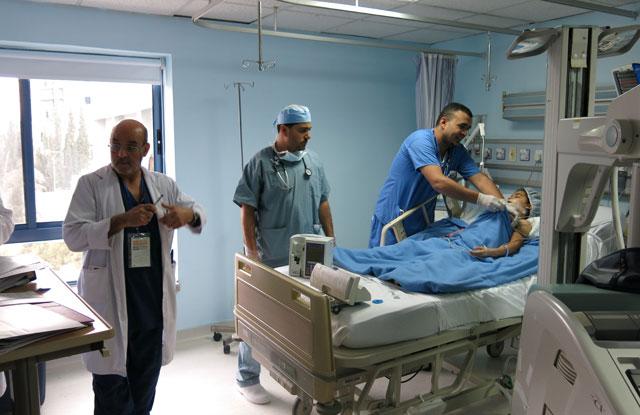You are here
Private hospitals struggle in face of ‘unfair’ challenges — sector leader
By Dana Al Emam - May 31,2017 - Last updated at May 31,2017
AMMAN — High electricity tariffs, increasing taxes and visa restrictions remain the major challenges facing the private hospitals' sector, according to the Private Hospitals Association's (PHA) President Fawzi Hammouri.
The "unfair" electricity tariffs imposed on private hospitals, which are nearly three times higher than tariffs imposed on factories, hotels and malls, result in a “huge” energy bill, he told The Jordan Times, explaining that electricity tariffs have increased by 250 per cent over the past five to six years.
The association has been trying to address this issue by generating electricity from solar power, Hammouri said, adding that the government has given the PHA an initial permit to build a 50-megawatt solar power plant to serve a number of private hospitals.
According to the Electricity Distribution Company (EDCO), private hospitals are under the "average consumers" category, which means that they have to pay 266 fils per kilowatt hour [kw/h] when their monthly electricity consumption exceeds 1,000 kilowatt hours.
Commenting on electricity tariffs, economist Wajdi Makhamreh said the recent drop in the number of visitors from the region who seek treatment at Jordanian private hospitals has affected hospitals' revenues, an issue that brought electricity tariffs issue to the fore.
While he described private hospitals' demand for lower tariffs as "reasonable", he said it should be temporary, at least until the issue of visas of restricted nationalities is solved.
Meanwhile, Makhamreh called on revisiting the entire electricity tariff scale applying to various sectors, in a way that does not favour one sector over the other, therefore preventing sectors from demanding equity with others when confronted with challenges.
Officials at the Energy Ministry were not available to comment on electricity tariffs despite repeated attempts by The Jordan Times.
A second issue, Hammouri said, lies in the increase of income tax from 14 to 20 per cent, and sales tax on medical supplies from 4 to 16 per cent.
The sales tax hike has been translated into an increase on patients’ bills, in varying rates, while the income tax increase has minimised the revenue margin, which is normally used for expansions, development and marketing, the sector leader said.
Despite the government’s promises to facilitate the process of issuing visa for visitors from countries like Yemen, Libya, Syria, Iraq and Sudan, whose nationals seek medical treatment in the Kingdom, these restrictions are still in place.
As a result, the sector witnessed a 35-40 per cent decline in the number of visitors in 2016, as prospect visitors found it easier to go to competing destinations like Turkey, India, Tunisia and Egypt.
However, the association has intensified its efforts in looking for new and untraditional markets for medical tourism to make up for the drop in the number of visitors from Arab countries, the physician said.
According to Hammouri, authorities have banned medical visa holders from Chad and Sudan from entering the country over the past two weeks, sending them back to their countries.
Official sources told The Jordan Times that this claim is “not true at all”.
On a different note, the PHA is exerting efforts to collect Libyan patients’ outstanding fees to Jordanian hospitals, which amount to nearly $350 million (JD248 million), excluding non-medical debts of Libyans, such as their unpaid dues to hotels and companies.
Hammouri told The Jordan Times that the health minister of the Libyan Government of National Accord has recently visited Jordan to discuss the issue.
While the Libyan official acknowledged the efforts of Jordanian hospitals, he said the Libyan embassy in Amman does not represent the Libyan Government of National Accord, a matter that hinders the payment process, according to Hammouri, who added that the collection of the money needs the government’s intervention.
Investments in the private hospitals’ sector exceed JD3 billion, the doctor noted, while and private hospitals employ over 35,000 workers, 95 per cent of whom are Jordanians.
“There are four hospitals currently under construction, in addition to 3-4 hospital projects being studied,” the PHA president said.
The association currently has 50 members, including six that joined in 2016.
In February, the PHA organised the Global Healthcare Travel Forum (GHTF), which saw the participation of some 650 health experts and practitioners from 42 countries, and witnessed the signing of a number of cooperation agreements.
The PHA’s new strategy, which went into effect at the end of 2016, has unified the efforts of a number of private hospitals to lead with medical tourism promotion, carrying out marketing online and via social media outlets.
Related Articles
AMMAN – The general assembly of the Private Hospitals Association (PHA) on Saturday discussed obstacles holding back growth at the sector.&n
AMMAN — The government’s decision to regulate the entry of nationals of some Arab countries to the Kingdom through the visa system has negat
AMMAN — Prime Minister Hani Mulki on Wednesday met with the president and members of the Private Hospitals Association (PHA), according to t


















